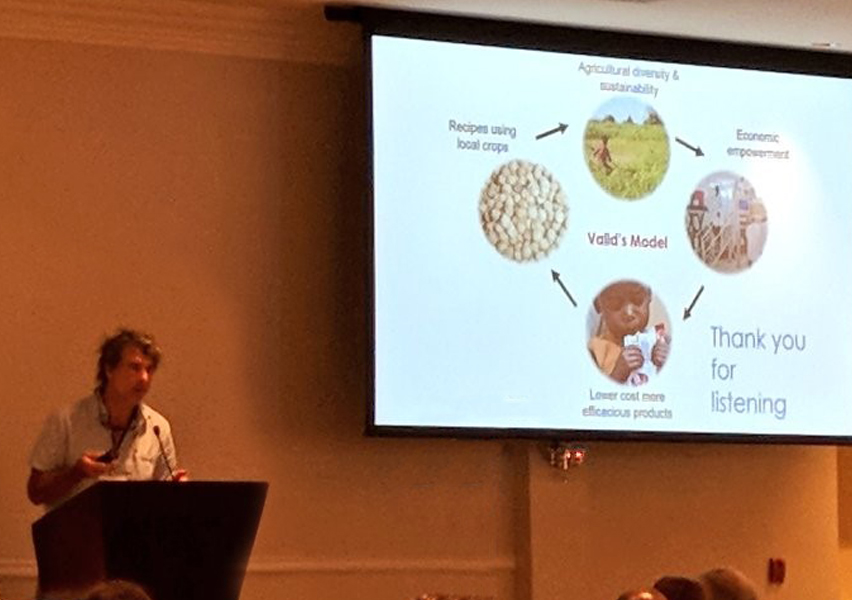Anti Fraud Policy
1. INTRODUCTION
Valid Nutrition (VALID) is determined to sustain its reputation in conducting its unique social business model with integrity and respect for all those with whom it works. This reputation is an asset which can only be maintained with observance throughout the company of the highest standards of behaviour – consistently applied by all employees. VALID’s Code of Conduct and Business Principles sets out clearly these standards and all employees are expected to adhere to them. Copies of the Code are available upon request.
This document, together with the Code of Conduct and Business Principles referred to above enshrines the relevant policies and procedures to ensure prevention against fraud and other forms of dishonesty, together with the steps that must be taken where any of these practices is suspected and/or discovered.
The policies and procedures apply to Directors, employees and volunteers. Any person associated with VALID and who commits fraud, theft or any other dishonest act, or who becomes aware of it and does not report it, will be subject to appropriate disciplinary action.
2. STATEMENT OF INTENT
As specified clearly in the Code of Conduct, VALID will continuously strive to ensure that all its financial and administrative processes are carried out and reported honestly, accurately, transparently and in a spirit of full accountability and that all decisions are taken objectively and free of personal interest or conflict. VALID will not condone any behaviour that falls short of these principles. While all employees (and volunteers) of VALID sign the Code of Conduct prior to commencing employment, all members of the organisation have a responsibility for ensuring these principles are put into practice and for reporting any breaches identified.
3. DEFINITIONS
a) Fraud:
A deliberate intent to acquire money or goods dishonestly through the falsification of records or documents. The deliberate alteration of financial statements or other records either by a member of the public, or by someone who works for or is a volunteer for VALID. The criminal act is the attempt to deceive and attempted fraud is therefore treated as seriously as accomplished fraud.
b) Theft:
Dishonestly acquiring, suing or disposing of physical or intellectual property belonging to VALID or to individual members of the organisation.
c) Misuse of equipment:
Deliberately misusing materials or equipment belonging to VALID.
d) Abuse of position:
Exploiting a position of trust within the organisation.
4. CODE OF CONDUCT
VALID’s Code of Conduct is intended to foster honesty and integrity. Directors, employees and volunteers are expected to lead by example in adhering to these policies, procedures and practices. Equally, members of the public, service users and external organisations (such as suppliers and contractors) are expected to act with integrity and without intent to commit fraud against VALID in any dealings they may have with the company.
As part of the Code of Conduct, VALID will provide a clear avenue through which concerns in relation to this policy can be raised by Directors, employees and volunteers and by those outside of the Company. A copy of VALID’s whistle-blowing policy is available to Directors, employees, volunteers, service users, suppliers and other third parties upon request.
Senior management are expected to deal promptly, firmly and fairly with suspicions and allegations of fraud or corrupt practice.
5. RESPONSIBILITIES
In relation to the prevention of fraud, theft, misuse of equipment and abuse of position, specific responsibilities are as follows:
a) Trustee Directors
The Directors are responsible for establishing and maintaining a sound system of internal control that supports the achievement of the Companies; policies, aims and objectives.
The system of internal control is designed to respond to and manage the broad range of risks that the Company faces.
The system of internal control is based on an on-going process designed to identify the principal risks, to evaluate the nature and extent of those risks and to manage them effectively. Managing the risks of fraud is considered in the context of the management of this broader range of risks.
b) The Chief Executive Officer (CEO)
Overall responsibility for managing the risk of fraud has been delegated to the CEO. His/her responsibilities include:
- Undertaking, as part of the updates of VALID’s Risk Management Profile a pragmatic review of fraud risks within the business;
- The design of an effective control environment to prevent fraud;
- Establishing appropriate mechanisms for:
- reporting fraud risk issues
- reporting significant incidents of fraud or attempted fraud to the Board;
- Liaising with the appointed external Auditors;
- Ensuring that all employees and volunteers are aware of VALID’s policies and understand their responsibilities in relation to combating fraud; it is intended to accomplish this through all key staff certifying that they have observed the code in full through signing the Code of Conduct on an annual basis; and
- Ensuring that appropriate action is taken to strengthen controls and procedures to minimise the risk of recurrence of previous frauds.
c) Senior Management Team
The Senior Management Team is responsible for:
- Ensuring adequate systems of internal control exist within their areas of responsibility and that controls operate effectively;
- Take all necessary steps to prevent/detect;
- Regularly evaluating and assessing the risks involved in the operations for which they are responsible;
- Reviewing control systems for which they are responsible;
- Ensuring that controls are being complied with and systems continue to operate effectively; and
- Implementing new controls to reduce the risk of recurrence of similar frauds;
d) Employees and Volunteers
Every member of staff or volunteer is responsible for:
- Acting with propriety, honesty and integrity in the use of VALID’s assets and resources including the handling and use of funds whether cash, receipts, payments or transactions with suppliers;
- Complying fully with the Code of Conduct; Being alert to the possibility that unusual events or transactions could be indicators of fraud;
- Alerting their line manager when they believe the opportunity for fraud exists e.g. because of poor procedures or lack of effective oversight;
- Reporting immediately to the line manager if they suspect that a fraud has been committed or see any suspicious acts or events; and
- Cooperating fully with whomever is appointed by management to conduct internal checks or reviews, or fraud investigations.
6. DETECTION AND INVESTIGATION
General
Whilst having regard to the requirements of EU and local Data Protection legislation, it is often the alertness of Directors, employees or volunteers and the general public to the possibility of fraud and corruption that leads to prompt detection of financial irregularity.
The Chair of the Board of Directors must be notified immediately of all financial or accounting irregularities, or suspected irregularities, or of any circumstances which may suggest the possibility of irregularities; including those affecting cash, stores, property, remuneration or allowances, or any irregularity in financial reporting or management reporting.
Reporting
Reporting of suspected irregularities is essential as it:
- Facilitates a proper investigation by experienced staff, and ensures the consistent treatment of information regarding fraud and corruption.
Disciplinary procedures
- Persons who are found guilty of fraud have committed an act of gross misconduct and will be dealt with in accordance with the HR Policy on Disciplinary Action. Proven allegations of fraud may result in dismissal.
- In addition, and where appropriate, VALID may refer significant fraud to the local law enforcement agencies with a view to initiating criminal prosecution. Consideration should be given to the local context and the consequences of initiating criminal prosecution against the individuals involved. In every case, the final decision whether or not to prosecute should be taken by:
- Overseas:Country Manager
- Central functions:Chief Executive Officer or Chairperson
- In cases of suspected payroll irregularities where a fraud investigation may not be possible, discussion should take place between the Chairperson and the CEO if it is thought disciplinary investigations are more appropriate.
- Malicious accusations may also be the subject of disciplinary action.
7. REVIEW
This policy will be reviewed on an annual basis and forms part of VALID’s risk management process.
Reviewed: 1st December 2021

Dr Steve Collins reflects on the opportunities and problems associated with the USD$250 million contribution announced by Administrator, Samantha Power of USAID – a positive catalyst for change?

VALID commissioned and achieved peer-review of a professional report to quantify objectively the overall climate impact profile of the amino-acid enhanced, plant-based RUTF recipe. It has found that the overall global warming potential impacts of the plant-based RUTF recipe are 47%-52% less than the milk-peanut based recipe.

Dr Steve Collins gives a hugely informative and enlightened interview to ENN podcast while discussing his candid Reflections on the UN Global Action Plan on Wasting.
